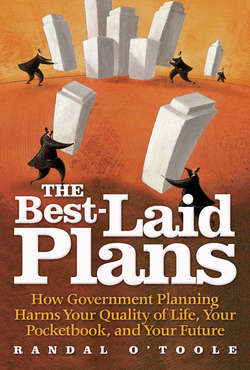Читать книгу The Best-Laid Plans - Randal O'Toole - Страница 4
На сайте Литреса книга снята с продажи.
Acknowledgments
ОглавлениеThis book should not be necessary. There are already many good books about why government planning does not work. Yet despite books such as Friedrich Hayek’s 1944 The Road to Serfdom and James Scott’s more recent Seeing Like a State, federal, state, and local governments continue to plan. So it is time to say, once again, that the emperor of planning has no clothes.
While the story’s outline may be familiar to some, I hope the details in this book will be fresh. My education in planning comes from three decades of often-painful experiences with land-use and transportation planners. I hope that some of this book’s readers will be able to learn through my experiences rather than having to repeat the process.
Writers such as Hayek, Ludwig von Mises, and Milton Friedman are little more than mythological characters to me. Instead, I am especially grateful to my real mentors: Ed Whitelaw, who taught me the value of economics in studying urban problems; and John Baden and his colleagues in Bozeman, Montana, who provided a framework that helped me interpret the information I gathered when studying the Forest Service and other government agencies.
I am grateful to Stephen Town, who did much of the research contained in the chapter on smart growth and crime, and Kathleen Calongne and Michael Cunneen, who did a considerable amount of the research that went into chapter 31. Kathleen also sacrificed much of her time both in reviewing a draft of this book and in assisting me with some of the other projects described in it. Peter Van Doren of the Cato Institute also made many helpful comments on the draft. Finally, I would like to thank my partner Vickie Crowley for supporting all the efforts that went into this book and for being my most faithful critic. Of course, I take full responsibility for any errors in the book.
